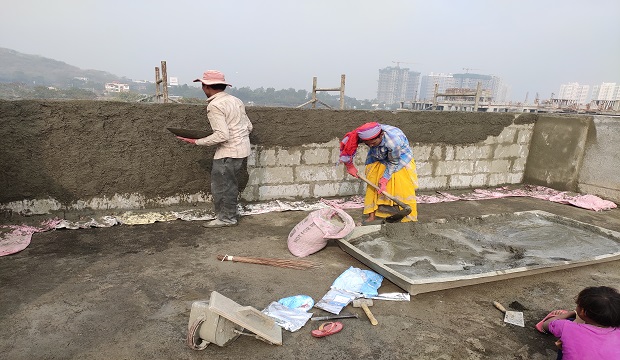Types of Mortar used for plastering
The selection of type of mortar for plaster depends on various factors such as availability of binding materials, atmospheric conditions, durability required, finishing desired, location of the surface, etc. There are mainly three types of mortar which can be used for the process of plastering.

(1) Lime mortar: The lime mortar consists of equal volumes of lime and sand, and these two materials are carefully ground in a mortar mill. The fat lime is recommended for plaster work because the fat lime contains 75% of CaO and it combines with CO2 of atmosphere and gives CaCO3 quickly. Thus, the lime sets quickly, but it imparts low
strength and hence, it can be used only for plaster work. The hydraulic lime contains particles which slake slowly as they come in contact with atmosphere. This results into blisters on the surface known as the blowing. The sand to be used for preparing lime mortar for plastering work should be clean, coarse and free from any organic impurities.
types of mortars used in plastering
In order to improve the binding properties of mortar, a kind of fragrant gum-gugal is added to the lime mortar. The quantity of gugal is about 16 N per m² of mortar. The gugal is bolled with enough quantity of fresh water before it is mixed with the lime mortar. In order to improve the adhesive and tensile properties of the lime mortar, the hump is about 10N per m3 of mortar. The mortar thus prepared is kept for 2 days before use and it is turned once in a day to make the mortar of uniform nature.
(2) Cement mortar: The cement mortar consists of one part of cement to four parts of clean, coarse and angular river sand by volume. The materials are thoroughly mixed in dry condition before water is added to them. The mixing of materials is done on a watertight platform and mortar of one cement bag only is prepared at a time and this quantity of mortar is consumed within 30 minutes after adding water.
(3) Water-proof mortar: This mortar is water-proof and it is prepared by mixing one part of cement, two parts of sand and pulverized alum at the rate of 120 N per m³ of sand. In the water to be used, 0.75 N of soft soap is dissolved per one litre of water and this soap water is then added to the dry mix.
Read more…